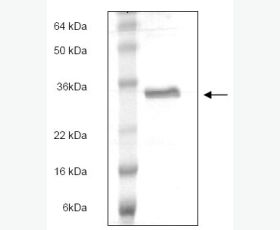Recombinant Human Cystatin A
| Product name: | Recombinant Human Cystatin A |
| Source: | E.coli |
| Purity: | Greater than 95% as determined by reducing SDS-PAGE. |
| Buffer Formulation: | Lyophilized from a 0.2 μm filtered solution of 20mM TrisHCl, 100mM NaCl, pH 8.0. |
| Applications: | Applications:SDS-PAGE; WB; ELISA; IP. |
| Storage: | Avoid repeated freeze/thaw cycles. Store at 2-8 oC for one month. Aliquot and store at -80 oC for 12 months. |
| UOM: | 100ug/50ug/200ug/1mg/1g |
| Source | E.coli |
| Description | Recombinant Human Cystatin A is produced by our E.coli expression system and the target gene encoding Ile2-Phe98 is expressed with a 6His tag at the N-terminus. |
| Names | Cystatin-A, Cystatin-AS, Stefin-A, CSTA, STF1, STFA |
| Accession # | P01040 |
| Formulation | Lyophilized from a 0.2 μm filtered solution of 20mM TrisHCl, 100mM NaCl, pH 8.0. |
| Shipping |
The product is shipped at ambient temperature. |
| Reconstitution |
Always centrifuge tubes before opening. Do not mix by vortex or pipetting. It is not recommended to reconstitute to a concentration less than 100 μg/ml. Dissolve the lyophilized protein in ddH2O. Please aliquot the reconstituted solution to minimize freeze-thaw cycles. |
| Storage |
Lyophilized protein should be stored at < -20°C, though stable at room temperature for 3 weeks. Reconstituted protein solution can be stored at 4-7°C for 2-7 days. Aliquots of reconstituted samples are stable at < -20°C for 3 months. |
| Purity |
Greater than 95% as determined by reducing SDS-PAGE. |
| Endotoxin | Less than 0.1 ng/µg (1 IEU/µg) as determined by LAL test. |
| Amino Acid Sequence |
MHHHHHHIPGGLSEAKPATPEIQEIVDKVKPQLEEKTNETYGKLEAVQYKTQVVAGTNYYIKVRA GDNKYMHLKVFKSLPGQNEDLVLTGYQVDKNKDDELTGF
|
| Background | Human Cystatin A (CSTA) is a member of family 1 of the cystatin superfamily, which is characterized by lacking of disulphide bonds an carbohydrates. Cystatin A is an intracellular inhibitor regulating the activities of cysteine proteases of the papain family such as Cathepsins B, H and L. Cystatin A is also implicated in a number of disease states. Due to altered proteolytic state in cancer progression, Cystatin A may play a role in the proteolytic pathways. |














